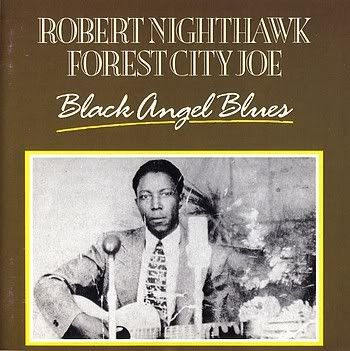
Robert Nighthawk - Black Angel Blues 1948-1964 - 1991 - Charly
A relatively unknown name in the blues world, but a very important one.He never achieved much commercial success but his great singing style and slide guitar expertise influenced many other musicians.Many of his songs are now blues standards.
TRACKS
01. My Sweet Lovin' Woman
02. Down The Line
03. Sweet Black Angel
04. Handsome Lover
05. She Knows How To Love A Man
06. Annie Lee Blues
07. Sugar Papa
08. Return Mail Blues
09. Good News
10. Six Three O
11. Prison Bound
12. Jackson Town Gal
13. Sorry My Angel
14. Someday
15. Memory Of Sonny Boy
16. Special Delivery Man
17. Shady Lane Woman
18. A Woman On Every Street
19. Sawdust Bottom
20. Ash Street Boggie
21. Mean Mistreatin' Woman
22. Lonesome Day Blues
CREDITS
Robert Nighthawk (Guitar), Robert Nighthawk (Vocals), Robert Nighthawk (Main Performer), Forest City Joe (Harmonica), Forest City Joe (Vocals)
BIO
Of all the pivotal figures in blues history, certainly one of the most important was Robert Nighthawk (b. Robert Lee McCollum (30 November 1909 in Helena, Arkansas).
He bridged the gap between Delta and Chicago blues effortlessly, taking his slide cues from Tampa Red and stamping them with a Mississippi edge learned first hand from his cousin, Houston Stackhouse. Though he recorded from the '30s into the early '40s under a variety of names -- Robert Lee McCoy, Rambling Bob, Peetie's Boy -- he finally took his lasting sobriquet of Robert Nighthawk from the title of his first record, "Prowling Night Hawk." It should be noted that the huge lapses in the man's discography are direct results of his rambling nature, taciturnity, and seeming disinterest in making records. Once you got him into a studio, the results were almost always of a uniform excellence. But it might be two years or more between sessions.
Nighthawk never achieved the success of his more celebrated pupils, Muddy Waters and Earl Hooker, finding himself to be much happier to be working one nighters in taverns and the Maxwell Street open market on Sundays. He eventually left Chicago for his hometown of Helena, AR, where he briefly took over the King Biscuit Radio Show after Sonny Boy Williamson died, while seemingly working every small juke joint that dotted the landscape until his death from congestive heart failure in 1967. Robert Nighthawk is not a name that regularly gets bandied about when discussing the all-time greats of the blues. But well it should, because his legacy was all-pervasive; his resonant voice and creamy smooth slide guitar playing (played in standard tuning, unusual for a bluesman) would influence players for generations to come and many of his songs would later become blues standards. © Cub Koda, All Music Guide
He left home at an early age to become a busking musician, and after a period wandering through southern Mississippi settled for a time in Memphis, Tennessee. There he played with local orchestras and musicians, such as the Memphis Jug Band. A particular influence was Houston Stackhouse, from whom he learnt to play slide guitar, and with whom he appeared on the radio in Jackson, Mississippi.After further travels through Mississippi, he found it advisable to take his mother's name, and as Robert Lee McCoy he moved to St. Louis, Missouri. Local musicians with whom he played included Henry Townsend, Big Joe Williams, and Sonny Boy Williamson. This led to two recording dates in 1937, the four musicians recording together at the Victor Records studio in Aurora, Illinois, as well as recordings under his own name, including "Prowling Night-Hawk" (recorded 5 May 1937), from which he was take his later pseudonym.
These sessions led to Chicago careers for the other musicians, but not for McCoy, who simply continued his rambling life, playing and recording (for Victor/Bluebird and Decca) solo and with various musicians, under various names. He also became a familiar voice on local radio stations. Then Robert Lee McCoy disappeared.Within a few years he reappeared as the electric slide-guitarist Robert Nighthawk, and began recording for Chess Records. This was also Muddy Waters' label; the two men's styles were close enough that they were in competition for promotional activity — and as Waters was the more saleable commodity, being more reliable and a more confident stage communicator, he received the attention. Though Nighthawk continued to perform and to record, he failed to achieve any great commercial success.
In 1963, some ten years later, Nighthawk was discovered busking in Chicago, and this led to further recording sessions and club dates, and to his return to Arkansas, where he appeared on the King Biscuit Time radio programme on KFFA. He had a stroke, followed by a heart attack, and died at his home in Helena.





6 comments:
Please, reupload this albom! I am harmonica fan and this albom is unique possibility to hear Forest City Joe!
Hi! Anonymous. Thanks for request. Expect new link in 2-3 days. Keep in touch
Hello! Many thanks for answer! You make me happy! Prev comment was done by me :)
Hi!b-w-b. Thanks for comment. Try this LINK
and please come back soon
Hello and many hanks to you again! What a great album! True blues gem!
Hello again,b-w-b. You are very welcome. Enjoy the music, and please keep in touch with me
Post a Comment